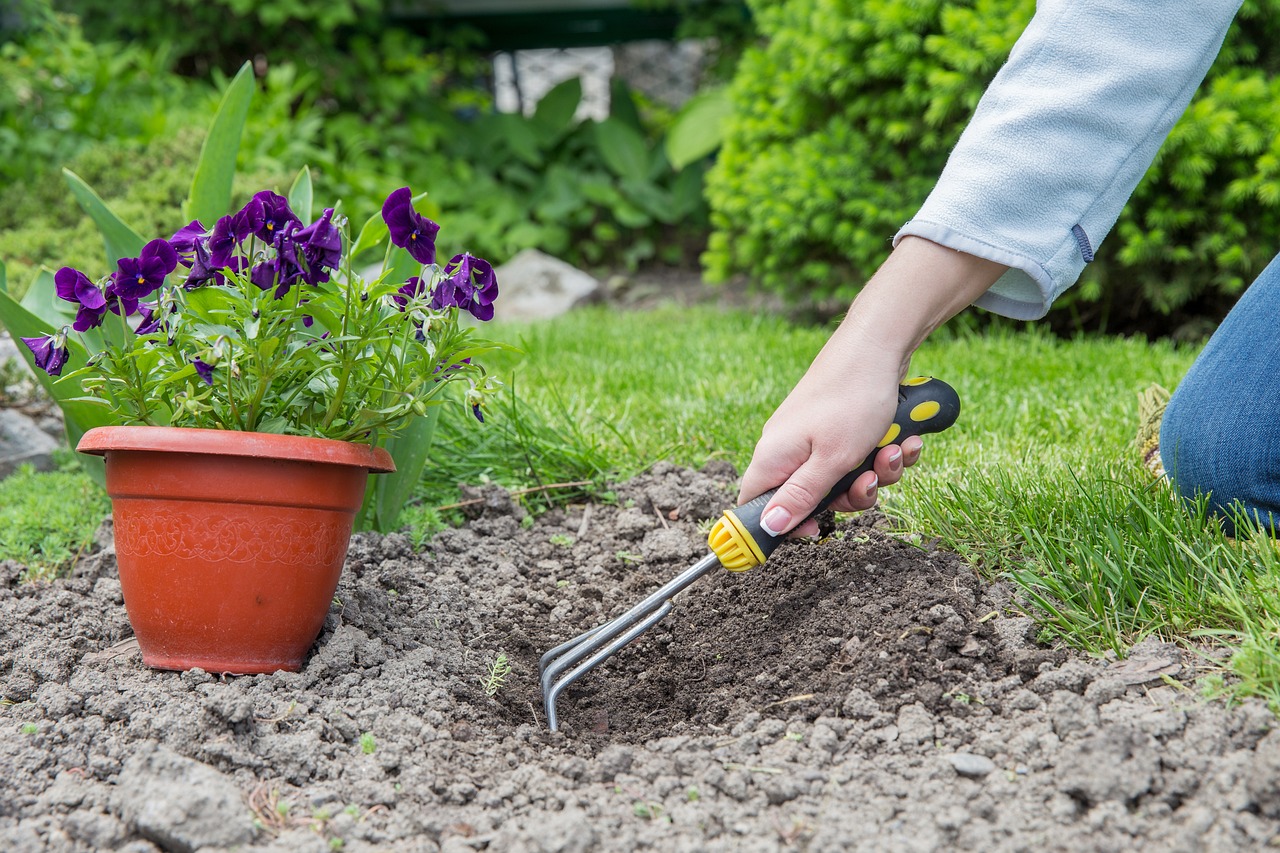The Impact of Urban Gardens on Food Sustainability
Urban gardens have emerged as a vibrant solution to the pressing issue of food sustainability in our cities. Imagine walking through a bustling urban landscape, where concrete jungles are softened by patches of green bursting with life. These gardens not only beautify our surroundings but also play a pivotal role in addressing food security, environmental challenges, and community well-being. In an era where food deserts are prevalent and access to fresh produce is limited, urban gardens serve as a beacon of hope, offering fresh fruits and vegetables right at our doorstep. They represent a grassroots movement towards a sustainable future, where communities take charge of their food sources, fostering resilience and self-sufficiency.
One of the most significant impacts of urban gardens is their ability to promote local food systems. By cultivating food within the city, we reduce the need for transportation, which in turn lowers carbon emissions associated with food distribution. This not only contributes to a healthier planet but also ensures that community members have access to nutritious food options. Furthermore, urban gardens often prioritize organic growing methods, minimizing the use of harmful pesticides and fertilizers that can degrade our soil and water quality.
Moreover, urban gardens act as crucial educational platforms. They offer opportunities for residents to learn about sustainable practices, including composting, crop rotation, and organic gardening techniques. This hands-on experience not only empowers individuals to grow their own food but also instills a deep appreciation for the environment and the importance of biodiversity. As people engage with the soil and plants, they develop a connection to nature that is often lost in our fast-paced urban lives.
However, the journey of urban gardening is not without its challenges. Limited space, zoning regulations, and soil contamination can pose significant hurdles. Nevertheless, these obstacles can often be overcome with community collaboration and innovative solutions. For instance, raised beds can be constructed to avoid contaminated soil, and community members can advocate for policy changes that support urban agriculture. By working together, urban gardens can thrive, and their benefits can be maximized.
In summary, urban gardens are more than just patches of green in our cities; they are vital components of a sustainable food system. They enhance food security, promote environmental stewardship, and strengthen community ties. As we continue to navigate the complexities of urban living, it is imperative to recognize and support the transformative power of these gardens. They remind us that even in the heart of the city, we can cultivate a connection to our food, our environment, and each other.
- What are urban gardens? Urban gardens are green spaces in cities where residents grow fruits, vegetables, and flowers, contributing to local food systems.
- How do urban gardens help with food sustainability? They provide fresh produce, reduce transportation emissions, and promote organic practices, enhancing food security.
- What challenges do urban gardens face? Common challenges include limited space, zoning laws, and soil contamination, but these can often be addressed through community efforts.
- How can I get involved in urban gardening? You can join local gardening groups, volunteer at community gardens, or start your own garden at home.

Benefits of Urban Gardens
This article explores the significance of urban gardens in promoting food sustainability, examining their benefits, challenges, and contributions to community well-being and ecological balance.
Urban gardens are not just patches of green in a concrete jungle; they are vibrant ecosystems that bring a plethora of benefits to our cities. Imagine walking through a neighborhood where the air is fresher, the community is closer, and the food is locally grown. That’s the power of urban gardens! They provide numerous advantages that extend beyond just beautifying the landscape. For instance, they play a crucial role in improving air quality by absorbing carbon dioxide and releasing oxygen. This is particularly vital in urban areas where pollution levels are often high.
Moreover, urban gardens enhance biodiversity by creating habitats for various species, from butterflies to birds, which are essential for maintaining ecological balance. These gardens serve as a sanctuary for pollinators, helping to sustain local ecosystems. They also promote healthier lifestyles by offering access to fresh produce, significantly reducing the need for processed foods that are often laden with preservatives and chemicals. The direct access to fruits and vegetables encourages residents to adopt healthier eating habits, which is a win-win for both personal health and community well-being.
Another remarkable aspect of urban gardens is their ability to foster community engagement. These gardens often become gathering places where neighbors can connect, share gardening tips, and even exchange produce. The act of gardening together cultivates a sense of community and belonging, which is invaluable in today’s fast-paced world. It’s not just about growing food; it’s about growing relationships. Urban gardens can act as a catalyst for social change, bringing together individuals from diverse backgrounds and promoting inclusivity.
To put it simply, the benefits of urban gardens can be summarized as follows:
- Improved Air Quality: They help filter pollutants and provide cleaner air.
- Increased Biodiversity: They create habitats for various species.
- Healthier Lifestyles: Access to fresh produce encourages better eating habits.
- Community Engagement: They foster social connections and a sense of belonging.
In conclusion, urban gardens are a crucial component of sustainable living in cities. They not only contribute to the physical health of the environment but also enhance the quality of life for urban dwellers. By embracing these green spaces, we are investing in a healthier future for ourselves and our communities.
Q: What are urban gardens?
A: Urban gardens are green spaces in city environments where individuals or communities grow plants, vegetables, and flowers, often on vacant lots, rooftops, or community spaces.
Q: How do urban gardens improve air quality?
A: Urban gardens absorb carbon dioxide and release oxygen, helping to filter pollutants from the air, which is particularly beneficial in densely populated areas.
Q: Can anyone start an urban garden?
A: Yes! Anyone can start an urban garden, whether in their backyard, on a balcony, or by participating in community garden initiatives.
Q: What challenges do urban gardens face?
A: Urban gardens may face challenges such as limited space, zoning regulations, and soil contamination, which can hinder their development and sustainability.

Challenges Faced by Urban Gardens
Urban gardens, while brimming with potential, face a myriad of challenges that can hinder their growth and sustainability. One of the primary obstacles is limited space. In densely populated urban areas, finding adequate land for gardening can be akin to searching for a needle in a haystack. Many cities are characterized by high-rise buildings and concrete jungles, leaving little room for green spaces. This scarcity often forces community gardeners to be creative, utilizing rooftops, balconies, and even repurposed lots to cultivate their plants. However, these unconventional spaces come with their own set of limitations, such as reduced sunlight and accessibility issues.
Another significant challenge is zoning regulations. Many urban areas have strict zoning laws that can restrict where and how gardens can be established. For instance, some neighborhoods may prohibit the use of certain types of land for agricultural purposes, making it difficult for gardeners to secure a legal spot to grow their food. Navigating these regulations often requires a deep understanding of local laws and sometimes even advocacy for policy changes, which can be daunting for community members who are simply trying to grow their own food.
Additionally, soil contamination poses a serious risk to urban gardening initiatives. Many urban soils are laden with pollutants from previous industrial use or improper waste disposal. Before planting, gardeners must often conduct soil tests to check for harmful substances like heavy metals and chemicals. This not only adds to the cost and complexity of starting an urban garden but also raises concerns about food safety. In some cases, raised beds filled with clean soil may be the only viable solution, but this requires additional resources and planning.
Urban gardeners also grapple with the challenge of water management. In cities, rainwater runoff can lead to flooding, while drought conditions can leave gardens parched. Implementing effective irrigation systems and rainwater harvesting techniques can help mitigate these issues, but they require knowledge, investment, and maintenance. Moreover, the impact of climate change cannot be overlooked, as unpredictable weather patterns can further complicate gardening efforts.
Despite these challenges, the resilience of urban gardeners shines through. Many communities are coming together to tackle these issues head-on. For instance, some are forming cooperatives to share resources and knowledge, while others are collaborating with local governments to advocate for more supportive policies. The journey may be fraught with obstacles, but the rewards of creating green spaces in urban environments are well worth the effort.
- What are the most common challenges faced by urban gardeners?
Urban gardeners commonly face challenges such as limited space, zoning regulations, soil contamination, and water management issues. - How can communities support urban gardening initiatives?
Communities can support urban gardening by advocating for favorable zoning laws, sharing resources, and organizing workshops to educate residents. - What is soil contamination and why is it a concern for urban gardens?
Soil contamination refers to the presence of harmful substances in the soil, which can pose health risks when growing food. Testing and remediation are crucial to ensure safety.

Community Engagement in Urban Gardening
Community engagement is the beating heart of urban gardening. It's not just about planting seeds in the soil; it's about sowing connections among people. When local residents come together to cultivate a garden, they aren't just growing vegetables; they're nurturing relationships, sharing knowledge, and building a sense of belonging. Imagine walking through an urban garden and hearing laughter, seeing neighbors exchanging tips on how to grow the best tomatoes, or sharing recipes for the freshest salads. This vibrant atmosphere is a testament to the power of community involvement.
One of the most significant aspects of community engagement in urban gardening is the sense of ownership it instills in participants. When individuals feel responsible for a garden, they are more likely to invest their time and energy into its success. This ownership leads to sustainable practices, as community members take pride in their work and strive to maintain the garden's health and productivity. Moreover, the collaborative nature of urban gardening fosters a spirit of teamwork, where everyone contributes their unique skills and perspectives. It’s like a potluck dinner, where each dish adds flavor to the overall meal.
To further enhance community engagement, many urban gardens implement volunteer programs. These programs not only invite local residents to participate actively but also provide them with hands-on experience in gardening. Volunteers learn about planting, maintaining, and harvesting crops, all while making new friends and strengthening their ties to the community. These interactions can lead to increased social cohesion, as people from diverse backgrounds come together with a common goal—growing food and supporting one another.
Additionally, educational workshops play a crucial role in fostering community engagement. These sessions empower individuals with knowledge about sustainable practices, gardening techniques, and nutrition. Imagine a workshop where kids learn how to plant seeds while adults discover the benefits of composting. This exchange of information not only enhances gardening skills but also cultivates a culture of self-sufficiency and environmental stewardship. By equipping community members with the tools they need, urban gardens become more than just green spaces; they transform into hubs of learning and growth.
In essence, community engagement in urban gardening is a multifaceted endeavor that promotes social connections, environmental awareness, and sustainable practices. When people come together to nurture a garden, they are also nurturing their community. The impact is profound, as these gardens serve as a microcosm of cooperation, resilience, and hope. As urban areas continue to expand and face various challenges, the importance of community engagement in urban gardening cannot be overstated. It’s a reminder that even in the concrete jungle, we can cultivate not just plants, but also relationships and a brighter future.
- What are the benefits of community engagement in urban gardening? Community engagement fosters social connections, enhances sustainability, and promotes a sense of ownership among participants.
- How can I get involved in my local urban garden? Look for volunteer programs or workshops in your area, or visit local community centers for information on how to participate.
- What skills can I learn from participating in urban gardening? Participants can learn gardening techniques, sustainable practices, and even cooking skills through workshops and community events.
- How do urban gardens contribute to community well-being? Urban gardens provide fresh produce, promote social interactions, and create a sense of pride and responsibility within the community.

Volunteer Programs
Volunteer programs in urban gardens are more than just a way to get your hands dirty; they are a gateway to community connection and environmental stewardship. When individuals roll up their sleeves to plant seeds, pull weeds, or harvest produce, they are not only contributing to a greener city but also cultivating relationships with their neighbors. These programs often attract a diverse group of participants, from seasoned gardeners to those who have never touched soil before. This diversity fosters a rich learning environment where knowledge and skills are shared freely.
One of the most exciting aspects of volunteer programs is the variety of activities they offer. Participants can engage in tasks such as:
- Planting and harvesting: Learning about seasonal crops and the best practices for growing them.
- Soil health workshops: Understanding the importance of soil quality and how to improve it naturally.
- Composting: Discovering how to turn kitchen scraps into nutrient-rich compost that nourishes plants.
- Garden design: Collaborating on layout plans that maximize space and aesthetics.
These hands-on experiences not only enhance gardening skills but also promote a sense of ownership and pride among participants. When people see the fruits of their labor—literally—they develop a deeper appreciation for where their food comes from. Moreover, volunteer programs often include social events that allow participants to celebrate their achievements together, strengthening community bonds.
Additionally, urban gardens often partner with local schools and organizations to create educational volunteer opportunities. This not only enriches the volunteers' experience but also introduces young people to the joys of gardening. Imagine a group of children learning to plant seeds, their faces lighting up as they see the first sprouts emerge from the soil. It's a beautiful cycle of learning and growth that benefits everyone involved.
In summary, volunteer programs are a vital component of urban gardening initiatives. They provide an avenue for community members to connect, learn, and contribute to the sustainability of their neighborhoods. As participants dig in the dirt, they are not just planting seeds; they are sowing the roots of community spirit and environmental awareness that will flourish for years to come.
1. How can I get involved in a volunteer program for urban gardens?
Most urban gardens welcome volunteers and often have a dedicated section on their website with information on how to join. You can also visit local community centers or social media groups related to urban gardening to find opportunities.
2. Are there any age restrictions for volunteering?
Many urban gardens encourage volunteers of all ages. Some programs may have specific activities designed for children, while others might require adult supervision for younger participants.
3. Do I need any gardening experience to volunteer?
No prior gardening experience is typically required. Volunteer programs often provide training and resources to help you learn as you go. It's a great opportunity to pick up new skills!
4. What should I wear when volunteering?
Dress comfortably and wear clothes that you don't mind getting dirty. Closed-toe shoes are recommended, and don’t forget to bring sunscreen and a water bottle!
5. Are there any costs associated with volunteering?
Most volunteer programs are free, but some may ask for a small donation or suggest bringing tools or supplies to help with the gardening efforts.

Education and Workshops
Education and workshops in urban gardens are not just about planting seeds in the ground; they are about planting ideas in the minds of community members. These sessions serve as a bridge connecting individuals to the world of sustainable gardening, nutrition, and environmental stewardship. Imagine walking into a vibrant garden filled with the scent of fresh herbs and the sight of colorful vegetables, where people of all ages gather to learn and share. It’s a space where knowledge blooms alongside the plants, fostering a culture of self-sufficiency and community resilience.
One of the primary goals of these educational initiatives is to empower individuals with the skills they need to cultivate their own food. Workshops often cover a range of topics, including organic gardening techniques, composting, and pest management. Participants learn not just how to grow food, but how to do it in a way that is environmentally friendly and sustainable. For instance, a workshop may involve hands-on activities where attendees can practice building a compost bin, understanding the decomposition process, and discovering how to enrich their garden soil naturally.
Moreover, these workshops also address the nutritional aspect of gardening. They often include cooking demonstrations that showcase how to prepare meals using freshly harvested produce. This not only highlights the importance of eating locally but also encourages healthier eating habits. When participants see how easy it is to incorporate fresh vegetables into their meals, it can spark a lifelong passion for cooking and healthy living.
To further enhance the learning experience, many urban gardens collaborate with local chefs, nutritionists, and environmental educators. These experts bring a wealth of knowledge and experience, making the workshops not only informative but also engaging. For example, a local chef might lead a session on how to create a delicious salad using seasonal ingredients, while a nutritionist explains the health benefits of each component. This fusion of culinary arts and nutrition education creates a holistic understanding of food that participants can carry into their daily lives.
Additionally, the social aspect of these workshops cannot be overlooked. They provide a unique opportunity for community members to come together, share their experiences, and build connections. As people gather to learn, they also share stories, tips, and even produce from their own gardens. This sense of community fosters friendships and collaborations that extend beyond the garden, creating a network of support among participants.
In conclusion, education and workshops in urban gardens are vital in nurturing both the land and the community. They equip individuals with the knowledge and skills necessary to embrace sustainable practices, promote healthy eating, and strengthen community ties. As more people engage in these learning experiences, the potential for urban gardens to transform lives and neighborhoods becomes ever more apparent.
- What types of workshops are typically offered in urban gardens? Workshops can vary widely, covering topics such as organic gardening, composting, cooking with fresh produce, and sustainable practices.
- Who can participate in these workshops? Workshops are usually open to everyone, regardless of gardening experience. They cater to all ages and skill levels.
- Are there any costs associated with attending workshops? Many urban gardens offer free workshops, while some may charge a nominal fee to cover materials. It's best to check with the specific garden for details.
- How can I find out about upcoming workshops? You can typically find information about upcoming workshops on the urban garden's website or social media pages, or by visiting the garden in person.

Environmental Impact of Urban Gardens
Urban gardens are not just patches of green in concrete jungles; they are vital ecosystems that contribute significantly to our environment. One of the most remarkable impacts of urban gardens is their ability to reduce urban heat. As cities grow, they tend to create heat islands—areas that become significantly warmer than their rural surroundings due to human activities and infrastructure. Urban gardens act as natural air conditioners, providing shade and releasing moisture into the air through a process known as transpiration. This cooling effect can help lower energy consumption in nearby buildings, reducing the need for air conditioning and ultimately leading to lower carbon emissions.
In addition to mitigating heat, urban gardens play a crucial role in improving water management. They absorb rainwater, which helps to reduce runoff and prevent flooding. This is particularly important in urban areas where impervious surfaces like asphalt and concrete prevent water from being absorbed into the ground. By capturing rainwater, urban gardens not only mitigate flooding but also filter pollutants, improving water quality in local waterways. This natural filtration system can be a game-changer, especially in cities that struggle with water pollution.
Furthermore, the presence of urban gardens promotes biodiversity in urban settings. They serve as habitats for various species, including birds, insects, and other wildlife. By planting a variety of native plants, urban gardeners can create mini-ecosystems that support pollinators like bees and butterflies, which are crucial for the reproduction of many plants and the health of our food systems. The more diverse the plant life, the more resilient the ecosystem becomes, providing a buffer against pests and diseases.
Urban gardens also contribute to carbon sequestration. Plants absorb carbon dioxide during photosynthesis, and urban gardens can help offset some of the carbon emissions produced by city activities. This is a small yet meaningful step towards combating climate change. In fact, a well-maintained urban garden can absorb a surprising amount of CO2 over its lifetime, making it an essential component in the fight against global warming.
Lastly, the social aspect of urban gardening cannot be overlooked. When communities come together to cultivate gardens, they foster a sense of environmental stewardship and awareness. This engagement leads to more sustainable practices and a greater understanding of ecological balance. People become more conscious of their impact on the environment, which can result in broader changes in lifestyle and community practices.
- What are the main benefits of urban gardens? Urban gardens improve air quality, enhance biodiversity, provide fresh produce, and foster community engagement.
- How do urban gardens help with food security? They provide access to fresh food in urban areas, especially in food deserts, and promote local food systems.
- What challenges do urban gardens face? Limited space, zoning regulations, and soil contamination are some of the key challenges.
- How can I get involved in urban gardening? You can volunteer at local gardens, participate in workshops, or start your own garden at home!

Urban Gardens and Food Security
Urban gardens are not just patches of green in concrete jungles; they are powerful tools for enhancing food security in our cities. In many urban areas, particularly in food deserts, access to fresh and nutritious food can be a significant challenge. Urban gardens address this issue head-on by providing local communities with a sustainable source of fresh produce. Imagine walking just a few blocks to pick ripe tomatoes, crisp lettuce, or fragrant herbs; this is the reality that urban gardens create.
Moreover, urban gardens foster local food systems that significantly reduce dependency on external food sources. This means that communities can grow their own food, which not only promotes self-sufficiency but also strengthens the local economy. By supporting local food production, urban gardens help to minimize the carbon footprint associated with transporting food over long distances. In fact, studies have shown that locally grown food can have a reduced environmental impact compared to conventionally sourced produce.
Here’s a quick look at how urban gardens contribute to food security:
| Contribution | Description |
|---|---|
| Access to Fresh Produce | Urban gardens provide immediate access to fresh fruits and vegetables, reducing reliance on processed foods. |
| Community Resilience | By cultivating their own food, communities become more resilient to economic fluctuations and food price increases. |
| Educational Opportunities | Urban gardens serve as living classrooms, teaching individuals about nutrition, gardening, and sustainable practices. |
Additionally, urban gardens are often accompanied by food education initiatives that empower community members to make healthier food choices. These initiatives teach essential skills such as cooking, meal planning, and understanding nutritional values. When people are educated about the benefits of eating fresh, local produce, they are more likely to incorporate these foods into their diets. This knowledge can transform eating habits and lead to healthier lifestyles.
In essence, urban gardens are a vital component of food security strategies in urban settings. They not only provide immediate access to fresh produce but also foster a sense of community and responsibility among residents. By cultivating a culture of self-sufficiency and environmental stewardship, urban gardens can help ensure that everyone has access to the food they need to thrive.
- What are urban gardens? Urban gardens are small plots of land used for growing fruits, vegetables, and flowers in urban areas, often managed by community members.
- How do urban gardens improve food security? They provide local access to fresh produce, reduce dependency on external food sources, and promote self-sufficiency.
- Can anyone participate in urban gardening? Yes! Many urban gardens encourage community involvement and often have volunteer programs.
- What resources are available for starting an urban garden? Local gardening clubs, community organizations, and online resources can provide guidance and support.

Local Food Systems
Local food systems are the backbone of urban gardens, creating a vital connection between the community and fresh produce. When you think about it, it’s like having a direct line to your food source, cutting out the middleman and ensuring that what you consume is both fresh and sustainable. These systems not only enhance the availability of nutritious food but also empower local economies by supporting small-scale farmers and producers.
Urban gardens play a significant role in establishing these local food systems. By providing a platform for residents to grow their own food, they foster a sense of community and encourage people to take charge of their dietary choices. Imagine walking through your neighborhood and finding a vibrant garden filled with tomatoes, peppers, and herbs, all tended to by your neighbors. It’s not just about growing food; it’s about cultivating relationships and nurturing a shared responsibility for the environment.
Moreover, local food systems help to mitigate the carbon footprint associated with food transportation. When food is grown locally, it doesn’t have to travel long distances to reach consumers. This reduction in transportation not only lessens greenhouse gas emissions but also means that the food is fresher when it reaches your plate. Think about the difference between biting into a tomato that was picked hours ago versus one that has been shipped across the country. The flavor and nutritional value are significantly enhanced when food is consumed close to where it is grown.
Urban gardens also serve as a platform for education and awareness about food sourcing. They can host workshops and events that teach community members about the importance of supporting local agriculture. For instance, participants can learn about:
- Seasonal eating and its benefits
- How to grow their own food
- The impact of industrial agriculture on the environment
By engaging with these topics, community members become more informed consumers who appreciate the value of local produce. Additionally, urban gardens can collaborate with local farmers’ markets, providing a space for residents to buy fresh produce directly from growers. This not only supports local farmers but also strengthens the community’s economy.
In essence, local food systems foster resilience within urban environments. They create a self-sustaining cycle where communities can rely on themselves for food security, reducing dependency on external sources that may not prioritize sustainability or fair practices. As more urban gardens sprout up, the potential for robust local food systems grows, leading to healthier communities and a more sustainable future.
- What are local food systems? Local food systems refer to networks that connect local producers with consumers, emphasizing the importance of sourcing food from nearby sources to enhance freshness and sustainability.
- How do urban gardens contribute to local food systems? Urban gardens provide a space for residents to grow their own food, support local economies, and reduce transportation emissions, thereby strengthening local food systems.
- What are the benefits of eating locally? Eating locally ensures that food is fresher, supports local economies, reduces carbon footprints, and encourages sustainable agricultural practices.

Food Education Initiatives
Food education initiatives associated with urban gardens are not just about teaching people how to grow vegetables; they represent a transformative journey towards understanding the very essence of our food systems. Imagine walking into a vibrant community garden, where the air is filled with the earthy scent of freshly turned soil and the laughter of neighbors sharing gardening tips. This is where the magic of education unfolds, empowering individuals to make informed choices about their nutrition and sustainability practices.
These initiatives often take the form of hands-on workshops, cooking classes, and community events that delve into various aspects of food production and consumption. Participants learn about the importance of local produce, the benefits of eating seasonal fruits and vegetables, and how to reduce food waste. By engaging in these activities, community members not only enhance their culinary skills but also develop a deeper appreciation for the labor that goes into food production.
One of the most exciting components of food education initiatives is the opportunity for participants to experiment with growing their own food. For many, this experience is eye-opening. They discover that a simple seed can sprout into a bountiful plant, providing nourishment and joy. Workshops often cover topics such as:
- Organic gardening techniques
- Companion planting
- Seasonal crop rotation
- Soil health and composting
Moreover, these initiatives foster a sense of community and collaboration. Neighbors come together to share recipes, cooking techniques, and even the fruits of their labor. This collective effort not only strengthens community ties but also encourages a culture of sharing and sustainability. The more we learn about our food, the more we realize the impact of our choices on both our health and the environment.
Additionally, food education initiatives often emphasize the importance of nutrition. Participants gain insights into how to create balanced meals, understand food labels, and make healthier choices that align with their lifestyles. This knowledge is particularly vital in urban areas, where access to fresh produce can be limited. By equipping individuals with the tools they need to make healthier decisions, urban gardens become powerful catalysts for change.
In essence, food education initiatives in urban gardens serve as a bridge connecting people to their food sources, fostering a sense of responsibility and stewardship towards the environment. They inspire individuals to think critically about their food choices and the broader implications of those choices on community health and sustainability.
What are food education initiatives?
Food education initiatives are programs designed to teach individuals about nutrition, cooking, and sustainable practices, often in conjunction with community gardens.
How can I get involved in food education initiatives?
You can get involved by participating in local workshops, volunteering at community gardens, or even starting your own food education program in your neighborhood.
What benefits do food education initiatives provide?
These initiatives promote healthier eating habits, enhance culinary skills, foster community connections, and encourage sustainable practices.
Can children participate in food education initiatives?
Absolutely! Many programs are designed to engage children and teach them about gardening, healthy eating, and the importance of sustainability in a fun and interactive way.
Frequently Asked Questions
- What are urban gardens?
Urban gardens are green spaces located within city environments where individuals or communities grow plants, vegetables, and fruits. They can be found on rooftops, vacant lots, and even in backyards, transforming concrete jungles into lush, productive areas.
- How do urban gardens contribute to food sustainability?
Urban gardens play a vital role in food sustainability by providing fresh produce locally, reducing the need for transportation, and promoting self-sufficiency. They help communities grow their own food, which not only increases access to healthy options but also supports local economies.
- What are the benefits of having an urban garden?
Urban gardens offer numerous benefits including improved air quality, increased biodiversity, and enhanced community engagement. They serve as a source of fresh produce, promote healthier lifestyles, and create green spaces that enhance the overall quality of life in urban areas.
- What challenges do urban gardens face?
Urban gardens often encounter challenges such as limited space, zoning regulations, and soil contamination. Overcoming these obstacles is essential for the success and sustainability of urban gardening initiatives, requiring community effort and innovative solutions.
- How can I get involved in my local urban garden?
Getting involved in a local urban garden is easy! You can volunteer, attend workshops, or participate in community events. Many urban gardens welcome help from community members, providing opportunities to learn about gardening and meet like-minded individuals.
- What role does community engagement play in urban gardening?
Community engagement is crucial for urban gardens as it fosters a sense of ownership and responsibility among local residents. When people are actively involved, they are more likely to adopt sustainable practices and strengthen community ties, leading to thriving gardening initiatives.
- How do urban gardens impact the environment?
Urban gardens positively impact the environment by reducing urban heat, improving water management, and promoting biodiversity. They help mitigate the negative effects of urbanization, creating healthier ecosystems within city landscapes.
- What is the connection between urban gardens and food security?
Urban gardens enhance food security by providing access to fresh produce in food deserts, where grocery stores may be scarce. They foster local food systems that reduce dependency on external sources, ensuring that communities can sustain themselves.
- What are local food systems, and how do urban gardens support them?
Local food systems refer to the production and consumption of food within a specific area. Urban gardens support these systems by connecting local producers with consumers, reducing transportation emissions, and promoting economic resilience within communities.
- What types of educational initiatives are associated with urban gardens?
Educational initiatives in urban gardens often include workshops on gardening techniques, nutrition, and sustainable practices. These programs empower community members to make healthier food choices and appreciate the value of local produce, fostering a culture of self-sufficiency.



















